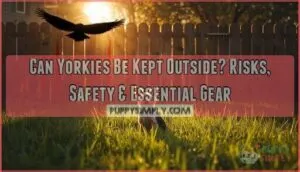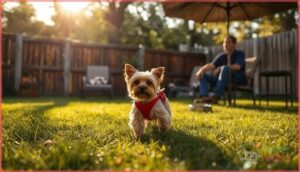This site is supported by our readers. We may earn a commission, at no cost to you, if you purchase through links.
A Yorkie left unattended in a backyard for just five minutes can become a target for predators, stolen by opportunistic thieves, or suffer heatstroke on an 80-degree day. These dogs weigh less than most house cats, with single-layer coats and minimal body fat that make them poorly equipped for outdoor life.
The question of whether Yorkies can be kept outside isn’t about whether they enjoy fresh air—it’s about whether their tiny bodies can handle the risks. From hawks that can snatch them mid-stride to temperatures that trigger hypothermia below 50°F, the dangers stack up quickly.
Understanding these breed-specific vulnerabilities helps you create safe outdoor experiences while keeping your Yorkie healthy and protected from preventable harm.
Table Of Contents
Key Takeaways
- Yorkies can’t safely live outdoors due to their 4-7 pound size, single-layer coat, and vulnerability to predators like hawks and coyotes—plus they’re at high risk for theft and temperature-related emergencies below 50°F or above 80°F.
- These dogs were bred as indoor companions and suffer from separation anxiety when isolated, requiring 30-60 minutes of supervised daily exercise split into multiple sessions rather than extended outdoor time alone.
- Safe outdoor practices demand constant supervision, secure 3-4 foot fencing buried 6-12 inches deep, properly fitted harnesses to protect their delicate windpipes, and protective clothing in extreme weather.
- Essential gear includes weatherproof coats for temperatures outside the 68-86°F comfort zone, emergency whistles for predator deterrence, paw protection wax, and mental stimulation toys to reduce the 29% anxiety spike some Yorkies experience outdoors.
Yorkshire Terrier Traits and Outdoor Suitability
Yorkshire Terriers weren’t bred to live outdoors, and their tiny frames come with some serious limitations you need to understand. Their size, temperament, and exercise needs all play a role in whether outdoor time is safe or stressful for your pup.
Let’s break down the key traits that determine how well your Yorkie can handle the great outdoors.
Toy-Size Vulnerabilities and Predation Risks
Because Yorkies weigh just 4 to 7 pounds, they’re vulnerable to predator attacks from raptors and wild animals. Over 50% of hawk attacks on toy breeds result in serious injury or death. It’s worth noting that birds of prey rarely attack larger pets.
Protect your Yorkie by understanding these predation risks:
- Dawn and dusk attacks account for 62% of incidents
- Hawks target dogs under 5 pounds most frequently
- Urban coyote attacks increased 70% since 2015
- Toy breeds left outdoors face heightened theft risks
Social and Companionship Needs
Beyond predation risks, your Yorkie’s social needs make outdoor isolation harmful. These Yorkie Terriers were bred as companions, not outdoor dogs. Research shows 18% suffer from separation anxiety, with isolation effects including destructive behavior and excessive barking.
A survey indicates that excessive barking is common among Yorkies with separation anxiety. Daily interaction aids social development and furthers animal welfare. Companionship benefits include reduced stress and improved dog behavior.
Without proper socialization, attachment behaviors become problematic, compromising your pet’s well-being.
Exercise and Mental Stimulation Requirements
Your Yorkie Terriers need 30 to 60 minutes of exercise daily, split into multiple sessions. This includes outdoor activities like brisk walks and indoor exercise alternatives such as fetch or puzzle toys. Mental stimulation through problem-solving games prevents boredom and anxiety.
Without adequate activity types and cognitive challenges, you’ll see destructive behaviors and weight gain. Adaptations needed include shorter sessions in extreme weather to protect their health impact.
Outdoor Risks for Yorkies
Your Yorkie faces real dangers outdoors that you can’t ignore. From predators and thieves to extreme weather and hidden environmental hazards, these risks can quickly turn serious for such a small dog.
Let’s break down the specific threats you need to watch for.
Dangers From Predators and Theft
Small dogs face real threats when left unattended outdoors. Predator attacks from hawks, coyotes, and foxes can happen within minutes, especially near wooded areas. Wildlife encounters have resulted in fatal incidents, including documented cases involving bears.
Small dogs left unattended outdoors face deadly predator attacks from hawks, coyotes, foxes, and even bears within minutes
Dog theft has increased by nearly 40% since 2021, with Yorkies among the top stolen breeds due to financial motivation—purebreds sell for over $1,000, making them targets in both urban and suburban neighborhoods.
Weather Sensitivity and Temperature Extremes
When temperatures drop below 50°F or climb above 80°F, your Yorkie faces serious weather-related health risks. Cold weather can trigger hypothermia quickly—their single-layer coat and low body fat offer minimal protection.
Heat sensitivity is equally dangerous, with heatstroke symptoms appearing during warm days.
These adaptability limits mean extreme weather demands preventive practices: protective clothing, regulated shelter access, and constant monitoring for health consequences.
Exposure to Environmental Hazards
Even in seemingly safe environments, your Yorkie faces hidden dangers that can impact their health. Chemical exposure from lawn pesticides has been linked to elevated cancer rates in outdoor dogs. Air pollutants from vehicle emissions can trigger brain inflammation, while parasite risks from ticks remain year-round. Drug exposure and metal contamination in urban areas add layers of concern. These environmental hazards make unsupervised outdoor time particularly risky for small breeds.
Safe Outdoor Practices for Yorkies
Your Yorkie can enjoy time outdoors safely when you follow the right practices. The key is never leaving your dog unattended and taking steps to prevent common dangers.
Here are three essential safety measures every Yorkie owner should follow.
Supervision and Monitoring Guidelines
Think of outdoor time like letting a toddler play in the yard—your Yorkie terriers need constant eyes on them. Veterinary advice consistently recommends never leaving these toy breeds unattended outside. Camera monitoring helps when you can’t be present, and it’s proven effective for dog outdoor safety guidelines.
For puppies, plan bathroom breaks every 2-3 hours with just 15-minute unsupervised intervals maximum. Emergency plans covering outdoor scenarios are essential dog safety precautions most owners overlook.
Secure Fencing and Predator Prevention
Your fence needs to stand at least 3-4 feet tall to keep your Yorkie contained and predators out. Vinyl panels or chain link with mesh gaps under 2 inches work best for material durability and visual barriers.
Install dig prevention by burying fencing 6-12 inches deep. Add motion-activated lighting and audible deterrents like emergency whistles for predator protection—these strategies greatly reduce animal attacks and improve animal safety.
Leash, Harness, and Outdoor Gear Recommendations
Your Yorkie’s outdoor gear acts as their first line of defense against injury and exposure. Proper equipment keeps them safe while allowing necessary exercise and bathroom breaks.
- Choose a 3/8-inch wide nylon leash (4-6 feet) with reflective stitching for visibility during evening walks
- Use a step-in or vest-style chest strap in XXS or XS to protect their delicate windpipe
- Add a waterproof raincoat or insulated winter vest when temperatures drop below 50°F
- Verify chest strap fit allows two fingers between fabric and body
- Keep total gear weight under 10% of your dog’s body weight to prevent strain
Environmental and Health Considerations
Your Yorkie’s body isn’t built to handle weather extremes the way larger breeds can. Temperature swings that seem mild to you can quickly become dangerous for a seven-pound dog.
Let’s look at the specific temperature ranges you need to watch and the health checks that keep your Yorkie safe outdoors.
Safe Temperature Ranges for Small Breeds
Temperature regulation is critical for your Yorkie’s safety outdoors. Small breeds like Yorkies have a narrow thermoneutral zone between 68°F and 86°F where they maintain body temperature comfortably. Below 45°F or above 85°F, critical temperature thresholds increase weather-related health risks substantially.
Risk factors include their size and coat type.
Preventive measures like protective clothing and following duration guidelines—limiting exposure to under 10 minutes in extreme weather—protect against hypothermia and heatstroke.
Health Monitoring and Veterinary Care
Beyond managing outdoor exposure, your Yorkie Terrier’s health depends on proactive veterinary care. Routine wellness exams every 6–12 months help catch breed-specific dog health concerns early.
Monitor these five critical areas:
- Dental disease prevention through daily brushing
- Weight management with portion control
- Nail trimming every 4–6 weeks
- Joint disorders screening for mobility issues
- Eye screening for progressive vision loss
Early detection transforms health condition outcomes.
Top 8 Essential Outdoor Products for Yorkies
Your Yorkie’s safety and comfort outdoors depend on having the right gear. From protective clothing to emergency tools, these products address the specific vulnerabilities small breeds face.
Here are eight essential items that can make outdoor time safer and more enjoyable for your Yorkshire Terrier.
1. Eco Friendly Small Dog Harness
A no-pull vest made from sustainable materials protects your Yorkie’s delicate windpipe during outdoor time. Look for recycled mesh fabric with comfort features like padded neck openings and safety buckles that won’t fail when your pup pulls toward a squirrel.
Vest durability matters—quality webbing withstands daily wear better than cheap alternatives. Size adjustability is critical for Yorkie Terriers, since proper fit prevents escapes and distributes pressure evenly.
Choose designs that work with your leash and accommodate changing weather conditions, from summer walks to bundled-up winter outings.
2. Emergency Survival Whistle Set
Your vest isn’t enough when predators lurk at dusk. A high-decibel emergency whistle provides instant protection for your Yorkshire Terrier during outdoor excursions. Metal pealess designs deliver 115-120 dB distress signals audible up to 400 meters—critical when hawks circle overhead or aggressive dogs approach.
Three short blasts alert nearby people to danger. Look for weatherproof models meeting safety standards with carabiner clips that attach securely to your Yorkie’s vest or your belt loop. This simple tool can save your dog’s life when seconds matter.
3. Waterproof Dog Rain Jacket Coat
Rain turns cold fast on tiny bodies. A waterproof dog rain jacket with a 15,000mm rating keeps your Yorkshire Terrier completely dry during downpours—far exceeding basic 10,000mm standards.
Look for adjustable chest straps and drainage holes that prevent water pooling against your Yorkie’s skin. Premium polyester membranes with taped seams block moisture while allowing breathability. Reflective buttons boost visibility during evening walks. Machine-washable designs simplify care.
This protective layer prevents hypothermia and fungal skin conditions common in wet Yorkshire Terriers exposed to rain.
4. Waterproof Dog Winter Coat Jacket
Cold weather hits Yorkshire Terriers hard—hypothermia develops in under 15 minutes below 32°F. A waterproof dog winter coat jacket with 220g polyfill insulation creates a protective barrier your Yorkie desperately needs. Premium models use three-layer polyester shells that block moisture while trapping body heat.
Size availability spans 9.4 to 35 inches, ensuring proper chest and belly coverage for toy breeds. Machine-washable designs simplify care maintenance.
This Yorkshire Terrier weather protection reduces joint stiffness and prevents frostbite during wet weather outings when temperatures drop.
5. Large Automatic Golf Umbrella
When weather conditions shift suddenly, you need reliable Yorkshire Terrier outdoor safety measures at hand. A large automatic golf umbrella with 62-inch coverage shields both you and your Yorkie from downpours during walks. Look for models offering SPF 50+ UV protection and wind resistance up to 45 mph—double-canopy designs prevent inversion during gusts.
Market trends show these umbrellas deliver high user satisfaction for material performance. This Yorkshire Terrier weather protection tool beats makeshift raincoat solutions when you’re caught outdoors unexpectedly.
6. Natural Dog Paw Protection Wax
Your Yorkie Terrier’s delicate paw pads need protection during outdoor time across varying weather conditions. Paw wax creates an invisible barrier against hot pavement, ice, salt, and rough terrain—clinical data shows natural formulas reduce cracking by 63% in small breeds.
These wax ingredients generally include beeswax and coconut oil, both safe if your dog licks them. Application frequency matters: reapply every 3-7 days for best paw hydration and weather protection.
Clean paws before each use to improve absorption and effectiveness for reliable paw protection.
7. Natural Dog Nose Balm Stick
Your Yorkie Terrier’s nose takes a beating during outdoor time—sun, wind, and cold can leave it dry and cracked. Natural nose balm sticks offer targeted moisture with lick-safe balm ingredients like coconut oil, beeswax, and calendula.
Veterinary approval backs these products for preventing weather-related health risks, with clinical reports showing visible improvement within days. Application frequency of 2-3 times weekly works best, especially before bedtime.
Market trends show growing demand for these specialty balms, and their compact stick design makes protecting your dog’s nose easy during any weather conditions.
8. Interactive Dog Snuffle Mat Toy
Mental stimulation matters just as much as physical exercise for your Yorkshire Terrier’s health and safety. Interactive snuffle mat toys engage natural foraging behavior while reducing anxiety by up to 29% during stressful outdoor conditions.
These mats greatly slow eating habits—cutting meal time by nearly 5 minutes—which reduces choking risk by 67% in small breeds. Veterinarians recommend them for breed suitability with toy dogs, and over 71% of trainers use them for mental enrichment.
They’re perfect for indoor days when outdoor living isn’t safe due to weather.
Frequently Asked Questions (FAQs)
What are some common signs of distress to watch for in Yorkies when they are outside?
Watch for excessive panting, persistent whining, or hiding behaviors outdoors. Shaking, pacing, or reluctance to play signal anxiety.
Social withdrawal and physiological signs like drooling indicate discomfort.
Sensory triggers—temperature extremes or loud noises—often cause distress in Yorkies.
Can Yorkies sleep outside overnight safely?
Leaving a Yorkie outside overnight? That’s like asking for trouble. Overnight Temperature Risks from hypothermia, Predator Exposure, Security Concerns from theft, Social Isolation, and poor Sleep Quality make outdoor shelter completely unsafe for Yorkshire Terriers.
How do I train my Yorkie for outdoors?
Start with short, supervised sessions in a secure area using a properly fitted safety vest. Focus on recall training, potty training, and socialization skills through positive reinforcement to build your Yorkie’s confidence outdoors.
What vaccines do outdoor Yorkies need?
Your Yorkie needs core vaccinations—DHPP and rabies—with boosters every one to three years.
Bordetella and canine influenza help with outdoor exposure.
Always consult your veterinarian for specific protocols based on outdoor risks.
Are outdoor dog houses suitable for Yorkies?
Outdoor dog houses aren’t suitable for Yorkies due to their small size, temperature sensitivity, and high social needs. These tiny dogs need indoor living with weatherproof gear and supervision during brief outdoor exercise, not isolated shelter.
Can Yorkies share outdoor space with cats?
Up to 73% of Yorkies show positive social tolerance with cats outdoors when both are socialized early.
Supervision, escape routes, and enrichment utilization help manage behavioral risks and guarantee safe coexistence between small dogs.
Conclusion
Your Yorkie’s safety outdoors hinges on the same principle as a ship’s anchor—constant vigilance keeps them grounded and secure. Whether Yorkies can be kept outside depends entirely on your ability to control every variable, from predators to temperature swings.
These dogs thrive indoors with supervised outdoor time, not prolonged exposure. Equip yourself with proper gear, maintain sharp awareness of risks, and prioritize their companionship needs. Protection isn’t optional—it’s the foundation of responsible ownership.















